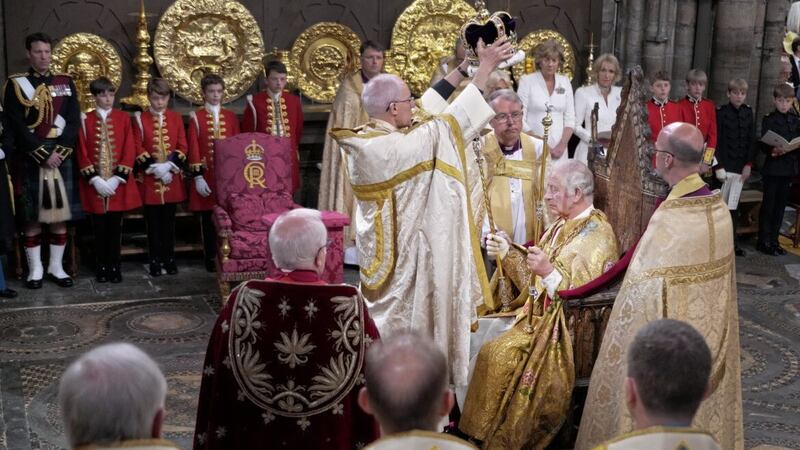Now the clearing up is done, it seems civil enough to focus on one weird element of that London ceremony as originally proposed.
Not the arrests of protesters with placards saying 'Not My King'. Given rushed-through legislation expanding police powers, this could hardly be called weird.
Nor was the weirdness the presence of Irish republicans. Civility requires of people in the public eye that they attend events no matter how alien they might find them, when attendance serves their politics and absence would only give their opponents ammunition.
In a forest of anachronism and sheer cheek, the stand-out curiosity was the plan to call on people in the big world to swear aloud an oath of allegiance. To the newly-crowned man, his heirs and successors.
It only emerged late in the day that people would be asked to do this in the midst of their private lives, not in the fancy dress of Westminster Abbey.
Dismayed reactions brought a scurrying Jonathan Dimbleby of the BBC dynasty, generally described as a Charles long-time friend, to pour soothing oil. Oh no, said he, not a Charles idea. The king he knew had never wanted to be 'revered'.
Instead, Dimbleby told The Times, it seemed "an initiative" by the Archbishop of Canterbury, Justin Welby, "who as we know is strongly evangelical".
It did seem just about plausible that someone supposedly in charge of a much-split state church might want a chorus of millions, if only as distraction, as he crowned the divorced supreme governor.
By this stage the still micro-managing but no doubt fatigued royal head had been toting around bags of flour (standing in for the crown) wrapped in velvet and then covered by a bowler hat. Or so claimed Private Eye, never the most respectful royal correspondent. (‘Historic Souvenir Issue’ cover: ‘Man in Hat Sits on Chair’.)
Archbishop Welby responded defensively that he had hoped spontaneous public swearing would "impart something spiritual". But an oath of loyalty?
To the northern Irish ignoring the whole caboodle while wishing loyal fellow citizens well, there came a whisper of old hurts long settled.
Aged ears at least may have caught a whisper. Under-50s almost certainly caught not a word, unless possessed of older relatives in the upper reaches of the law who having been Queen’s Counsel are now King’s Counsel.
Those so elevated since mid-2000 have sworn no fealty to the Crown. They kept their own counsel thanks to the efforts of a few, more numerous as success beckoned.
The northern legal world had become heftily Catholic before the campaign. But to head further upwards, towards judgeship, it was essential to become a QC.
Those who wanted an end to the oath’s insistence on fealty towards the monarch had to petition the north’s Lord Chief Justice. To petition the Lord Chancellor.
Lord Chief Justice Robert Lowry told the Lord Chancellor of the day that his fellow judges opposed any change. But Mr Michael Lavery QC argued for the lead objectors that a forced promise to "well and truly serve Queen Elizabeth II" was contrary to the Good Friday Agreement.
Angela Ritchie, solicitor for the protesting barristers, highlighted the Agreement’s recognition of dual citizenship. She also made the point that serving the Queen only came up when barristers "sought advancement".
Oaths and declarations had been outlawed in employment and the public service since 1973, she pointed out. No such declaration was required for MLAs nor, since 1998, for RUC officers.
It was the spreading refusal of "forestry and drainage labourers" in Tyrone and Fermanagh to take the oath of allegiance, imposed likewise on teachers and civil servants, plus protests by the teachers’ union, that pushed first direct ruler Willie Whitelaw. Roads and gutters needed drained. Out went ‘fealty’.
Dismantling the protestations of loyalty that Unionist Stormont demanded of ‘the minority’ took a long time. And it had all boomeranged. You can pretend allegiance, but it cannot be forced.








